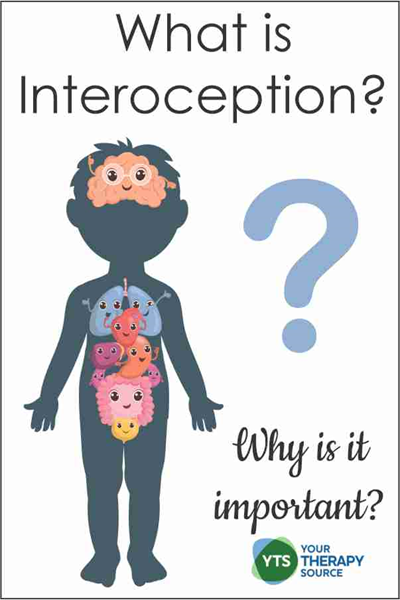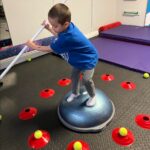Interoception and Autism
Interoception is more than just a buzzword; it’s about sensing signals from within your body and interpreting them to understand your physiological state. Interoception plays a vital role in how we perceive and respond to internal bodily sensations like pain, sleep, toileting, body temperature, hunger and thirst cues. Imagine knowing exactly when you’re hungry, feeling your heartbeat, or recognizing the urge to take a deep breath. These are interoceptive skills, and they are essential for both basic and advanced functions, such as:
- Pain perception
- Bathroom needs
- Being aware of your emotional state
- Digestion – recognizing hunger and thirst
- Body temperature

Interoception is Crucial for Several Reasons
Interoception is fundamental for maintaining physical and emotional balance, enhancing self-awareness, and facilitating adaptive responses to internal and external stimuli. It has been deemed one of our senses along with proprioception (movement) and vestibular (balance).
Interoception could impact neuroplasticity. Neuroplasticity refers to the brain’s ability to form new neural connections and adapt to different environments, like dealing with noise or distractions from a TV or conversations around you. Or, maintaining your regulation when you have a difficult activity or request being asked of you. Ignoring interoceptive factors might ultimately affect how your child responds to various situations. Do they have the ability to check in with themselves and use coping strategies to help get them through?

- Self-Regulation: It helps individuals regulate their emotions, behavior, and physiological responses by recognizing internal cues such as hunger, thirst, and fatigue.
- Autonomic Functions: Interoception plays a role in regulating autonomic functions like heart rate, digestion, and breathing, which are essential for maintaining overall health and well-being.
- Sensory Integration: It contributes to the integration of sensory information from the body and the environment, allowing individuals to respond appropriately to internal and external stimuli. It can help them filter out what is not important.
- Body Awareness: Interoception enhances body awareness, promoting a sense of connectedness between the mind and body. This awareness is essential for activities like sports, dance, and yoga, where precise body movements are required.
- Emotional Awareness: Interoception helps individuals recognize and understand their emotional states, leading to better emotional regulation and interpersonal relationships.
The Challenge for Individuals with Autism
Regardless of age, the development of interoception can slow down or even stop for many autistic people. While the exact reasons remain unclear, it is believed that trauma and self-protection mechanisms play a significant role. Sadly, many autistic individuals experience trauma, which may further hinder their interoceptive awareness.
Without strong interoceptive skills, everyday tasks and emotional regulation can become challenging. Improving these skills can lead to:
- Better emotional control
- Improved physical health
- Enhanced quality of life
Assessing Interoception
When attempting to evaluate your child’s interoceptive awareness, it is not appropriate to ask ‘do you know when you feel hot?’ as many people will say ‘yes’, regardless of their interoceptive awareness. Instead, one should ask ‘how do you know when you feel hot?’ or ‘what signals does your body show you (or make) so that you know when you are getting hot?’ If someone does not yet have a basic level of interoceptive awareness, this needs to be developed before they can focus on their emotional awareness.
At BTG, we can assess your child’s interoceptive abilities and help you better manage them.
Explore More From Related Topics

Interoception
Interoception is the perception and awareness of internal bodily sensations such as pain, sleep, toileting, body temperature, hunger and thirst cues.

Purposeful Motor Skills
Purposeful motor skills are intentional and goal-directed movements that enable individuals to interact effectively with their environment.

Self-Regulation
Self-Regulation is important for kids to manage emotions, focus, make good choices, and develop resilence.

Sensory Processing
Sensory processing refers to how our nervous system receives and interprets information from the environment through our senses and how we respond to that information.
Ready to Learn More?
If you’re ready to see how Occupational Therapy can transform the life of your child with autism, we’re here to guide you through every step of the process. We believe in the incredible potential of your child and are committed to providing the support, care, and expertise needed to help them shine brightly.
To learn more about our occupational therapy services or to schedule an initial consultation, contact us today. Together, we can pave a pathway to progress, filled with learning, growth, and endless possibilities.
